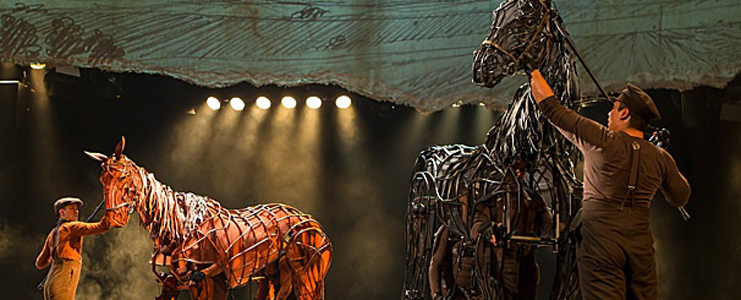The simple story of a horse and his boy set in World War I enthralls attendees with an action-packed plot and incredible production.
[media-credit name=”Broadway in Atlanta” align=”aligncenter” width=”741″] [/media-credit]
[/media-credit]
War Horse is a play that is unlike any other current production, as the main character Joey is not just a horse but also a massive puppet. While this sounds implausible and unenjoyable, the art and sophistication of the puppet and puppeteers create a fully realized character. Joey and the other puppets each have a life of their own, complete with ears twitching and chests heaving with breath.
The character of Joey takes no less than three actors to create: “The Head”, “The Heart” and “The Hind.” Each comprises an essential role that goes far beyond merely carrying the weight of a 100 lb. puppet or moving its parts. Instead they take hold of the viewer’s imagination and steer them on a journey from the farm fields to the battlefields.
That is where the greatest strength of the plays lies—in capturing the viewer and allowing their imagination to run free. The minimalist set design calls for readers to create homes and fields from the odd combination of props and screened images. The puppeteers are also constantly visible, but this adds to, rather than detracts from, the reality and life of Joey and his other horse companions as they gallop, struggle and occasionally suffer.
War Horse offers plenty of scenes memorable almost solely for their incredible production. Joey’s transformation from a foal to a full fledged beast, the first charge on the German lines and the battle with a huge prop tank all easily come to mind. Other scenes are sure classics for their intensity and passion, including Joey’s first plowing, the death march of pulling German machine guns as they retreat and the harrowing tearjerker of an ending.
Even though Joey is the true star of the show, the human characters are not to be outdone. As Albert, Joey’s faithful owner and companion, Andrew Veenstra embarks on a perilous journey to find his beloved horse after he is sold to the calvary. Along the way he meets a slew of characters ranging from a German deserter to a French farm wife and her daughter to officers (and their horses) in the British Army. All along, the tightly woven story slowly brings Joey and Albert closer, bringing along plenty of toiling and suffering for all.
Though what will be most talked about is the amazing production of this play, there is plenty of heart in War Horse; often Albert is questioned for his love of an animal when it causes him to forget his own human brothers. The play also offers a particular insight into war as the unknowing horses are driven into a situation they cannot come to comprehend, bringing a whole new filter on the common loss of innocence. Joey and his friends are thrown into a war where they are now outdated by machine guns and barbed wire, are expected to survive and are forced to switch allegiances based on who currently “owns” them.
The play is smart and well-done, more than deserving its five Tonys upon its release. Steven Spielberg adapted War Horse into a sweeping epic film last year, but in his inclusion of live horses and sweeping landscapes created an antithesis of the stage version. The play takes advantage of what it lacks and cannot reproduce, creating an immersive experience for viewers who become deeply involved and invested in its characters. With easily the best puppeteering on stage, War Horse is more than worth seeing as Joey and Albert enter in the fabled realms of classic pairs of boys and their beloved animal companions.